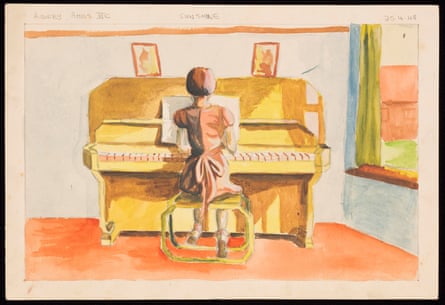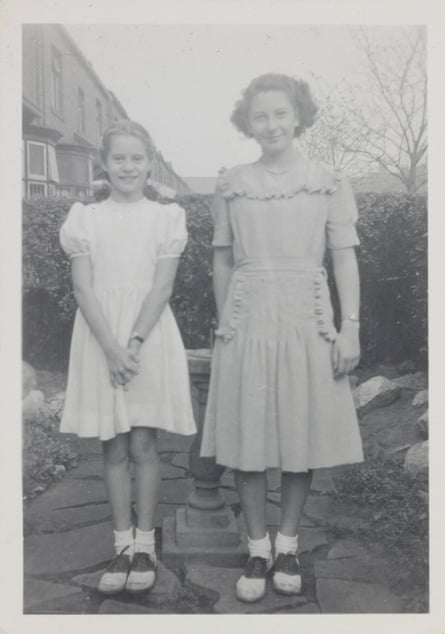Audrey Amiss, daughter of shopkeepers in Sunderland, gained attention from the media when she secured a spot at the Royal Academy’s schools in London with her talent. During her last semester, she experienced her first mental breakdown and was hospitalized. This led to her absence from the art world for 30 years as she worked as a shorthand typist in the civil service. However, unbeknownst to most, Amiss never gave up on her passion for art. In her own words, she used to follow the social realism tradition, also known as the kitchen sink school of painting, but now considers herself avant-garde and often misunderstood.
Carol Morley, a filmmaker, was not familiar with Audrey Amiss until she received a screenwriting fellowship from the Wellcome Foundation medical charity. She was informed about an archive belonging to a woman who collected wrappers of everything she ate on a daily basis. The collection, owned by Audrey Amiss, had not been organized yet. Morley describes it as almost being like a legend and was given two hours to view it, but ended up spending the whole day. She discovered many valuable items, including Amiss’s passport which listed her occupation as “Typist, Artist, Pirate, King.”
Morley was given the inspiration for her whimsical road movie by the four words mentioned. The movie features Amiss, who helps a beetle and a mouse in her cluttered apartment. This idea originated from a conversation between Morley and Monica Dolan, who plays Amiss and received a Bafta for her performance as Rose West in ITV’s Appropriate Adult. Dolan suggested showing Amiss being tender towards a beetle, which Morley found brilliant due to Carl Jung’s fascination with scarab beetles.

Upon receiving the script, Dolan was taken aback. “I didn’t intend for a beetle, I simply meant something similar to a beetle,” she explains. “You must have said it without realizing,” Morley responds. “And it came with a remarkable handler who could manipulate it,” Dolan adds. “Yes, and she also had a mouse,” says Morley. “Who would have imagined there was someone who could handle both mice and scarab beetles?” ponders Dolan.
Unfortunately, Amiss, who passed away at the age of 79 in 2013, would not have been able to witness this delightful interaction taking place in a solemn hotel room filled with camera equipment and makeup supplies. Morley is distributing Typist Artist Pirate King badges like candy and sporting a striking jacket adorned with a bright neon yellow car. This is a nod to the old car that Amiss persuades her devoted psychiatric nurse Sandra to embark on an impromptu road trip from London to Sunderland. Kelly Macdonald, who portrays Sandra (also known as Sandra Panza, according to Amiss), has joined us today from her residence in Glasgow.
The success of Typist Artist Pirate King relies heavily on the chemistry between its two lead actors. Even when frustrated, Sandra (played by Macdonald) remains loyal to Amiss (played by Dolan), who sees everyone around them as either friend or foe. Amiss crashes a yoga class, believing it to be taught by their former headmistress, and causes a scene at a roadside cafe where they are convinced the couple there wronged them in the past. Initially, Sandra is in control while Amiss sketches everything, but as the story unfolds, it becomes clear that Sandra is also searching for a strong personality like Amiss’s.
The director, discussing Sandra, notes that mental health nurses often have to conceal their thoughts. They also mention that Kelly possesses a certain level of depth. Due to the pandemic, their initial interaction occurred through a video call. However, Macdonald does not remember it, despite it leading to her being hired for the job. She simply comments that it was a peculiar time.
The trio finally reunited in 2021, just before embarking on a challenging 25-day filming schedule that required frequent travel between Yorkshire and Sunderland. According to Dolan, they were faced with a dilemma a few times: either stay in Leeds and endure a long drive, or pack light and spend the night in Sunderland. The driver mentioned that he had never experienced a job like this before.
Despite their obvious connection, the Covid regulations prevented them from meeting frequently outside of their roles. This made Macdonald feel surprised when Dolan suddenly rushed out of her trailer to bid farewell at the end of filming. She thought, “Who is this woman with her dark hair, assuming she knows me?”

Dolan, who had just returned from filming a TV series in Portugal, admitted that she was initially hesitant to play a character much older than herself. She had her doubts about portraying a septuagenarian at the age of 50. As she prepared for the role, she realized that her usual approach of asking herself questions didn’t apply in this case. However, she soon discovered that Audrey’s strong personality allows her to shape her surroundings to fit her own image. Additionally, the film explores the connection between mental health and art, giving Dolan the opportunity to portray both a mental health patient and an artist through Audrey’s perspective.
Audrey and Sandra can be compared to Don Quixote and Sancho Panza, as they are a slower version of the iconic duo from “Thelma and Louise.” Morley acknowledges that it would be wrong not to recognize this film as one of the greatest feminist road movies of all time. The movie not only featured female leads, but also had a mostly female crew. This created a unique and peaceful atmosphere on set, according to both actors. Unlike other experiences where loud male voices were needed to be heard, there was no shouting on this set. MacDonald notes that this has been a common occurrence in her career, with a lot of yelling needed to get everyone in their place.

Every morning, Morley and Dolan would meet in the makeup truck to put ink stains on Dolan’s hands because Amiss often used leaky felt-tip pens. “At that time of day, you don’t always feel like talking, but it’s important to bond,” says Morley. Despite the long and busy 14-hour days, this was a peaceful way to start. Dolan remembers asking for her scenes to be filmed last because she was still studying her lines. “Sometimes we had to move on to other scenes,” says Macdonald. “But I trusted that if I looked at Carol and she said, ‘Don’t worry, we’ve got it’, then we did indeed have it.”
Morley states that the main obstacle was completing all the filming during daylight hours, as she always avoids reshooting. When capturing the final scene on the roadside, featuring Gateshead’s Angel of the North, she only had five minutes to do so. This was a rare moment when the actors were informed of the time constraints. Dolan recalls Morley saying something along the lines of “If you go to the bathroom, we might miss the shot!” in a joking manner.
The movie is a tribute to Amiss’s sister Dorothy, who had the chance to read the screenplay but tragically passed away during the editing process. Morley remembers: “She told me, ‘Thank you for bringing back my Audrey.’ I was deeply touched by her words because she was known by her neighbors as someone to avoid. But what I admire about Audrey is that despite the challenges and pain she faced in life, she maintained a cheerful attitude. She found joy in things that most people would overlook, like a bag of Quavers or the wrapper from a takeout meal.”
Before I depart, the discussion shifts towards potential future partnerships. Both performers have packed schedules. Dolan is set to star in the second season of the crime show Sherwood, and her first play The B*easts, which received a fringe first award, is currently being translated into Spanish and Italian. Morley outdoes her with the announcement of a new venture, a movie about a witch who can time travel. “I have never written for particular actors before,” she reveals. “But you’re in it, and you’re in it – and so is Maxine Peake.”
“Oh,” exclaims Macdonald with delight. “I have always felt destined to be a witch.”
Source: theguardian.com


